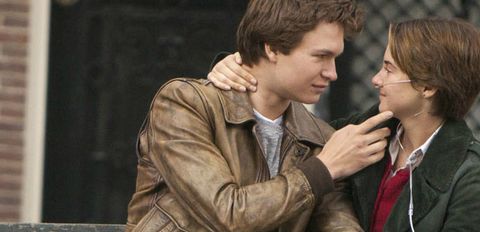When you're a teenager, the world seems chronically unfair, and any little drama can be blown up to feel like a life-or-death scenario. Both of these relatable elements of adolescence have become cliché in coming-of-age narratives, but the tender and tragic romance The Fault In Our Stars gives new weight to these themes through the story of two teenagers who find love while coping with cancer. And remarkably, it's more uplifting than depressing.
Based on the beloved novel by John Green, The Fault In Our Stars centers on sixteen-year-old Hazel Grace Lancaster (Shailene Woodley), who has earned her angst fair and square by suffering through terminal cancer since she was thirteen. Wrapped in sweatpants and self-induced isolation, she's worrying her loving parents (Laura Dern and Sam Trammell). So they push her to make friends via a cancer kids support group.
There, Hazel, who has given up on life, meets Augusts "Gus" Waters (Ansel Elgort), a cancer-survivor/basketball player with an indomitable spirit and an undeniably charming smile. The two instantly connect. And even as Hazel tries to push him away to spare him the heartbreak of her inevitable death, Gus is tireless in his devotion and love. No matter what happens.
This will be a love story that girls cling to and cry over for decades to come. It's got the works: a relatable every-girl wracked with insecurities and fears, a dreamy boy who's kind and endlessly charismatic; an enviable romance; a winsome and sometimes weepy soundtrack; and a finale guaranteed to make you pull out the tissues. Woodley is affable even in Hazel's sharp-tongues angst. Elgort is pretty-boy perfection, with just the right sprinkling of humor. The Fault In Our Stars didn't need to be especially good to pull in teen girls, it just needed to exist in a lull between YA releases. But remarkably--and thankfully--director Josh Boone didn't just strive to make a decent tearjerker. He made a movie that is buoyant with the bitter and the sweet, crafting a concoction that is devastating and exhilarating.
This is a film that was smartly built from the start. Adapting Green's adored story was Scott Neustadter and Michael H. Weber, the scribes behind similarly sharp films like (500) Days of Summer and The Spectacular Now. These guys not only get how it feels to be a teen girl, but also have an extraordinary gift for balancing comedy and drama, plus a fantastic ear for dialogue. The Fault In Our Stars' script shines on its own. Then you bring in Boone's outstanding cast.
Woodley is predictably wonderful as Hazel. The actress who cut her teeth in The Secret Life of the American Teenager is an old hand at portraying teen turbulence and trauma. Whether grappling with her own mortality, her "first time," or how to say goodbye, Woodley pulls us through with Hazel, offering weighted looks and a breathy, sometimes broken narration. Hazel is our center to this world; Woodley grounds her with great care and (fittingly) grace. And her chemistry with Elgort is instantly electric.
Elgort proves he's much more than a pretty face, painting Gus as a young man of great bravado, but deep fears. While much of his performance is non-threatening flirtation and goofing around with his wisecracking bestie, Isaac (Nat Wolff, in a lively and neat performance), Elgort likewise nails Gus' dark moments with an unsettling stillness. In doing so, he makes the threads of The Fault In Our Stars even richer and more vibrant with emotion.
While parents are often shunted to the sides of teen stories, The Fault In Our Stars keeps Hazel's in the mix. And the movie is all the better for it, as Dern and Trammell radiate with love, edged with grief. Too frequently, teen girl stories have their heroines running from their mother's influence, or laughing them off as clowns. But Hazel and her mother are close, and it’s a bond that feels as real and important as her connection to Gus. Trammell is adorable as the well-meaning dad, but its Dern and Woodley's scenes together that really sing. There's a push-and-pull there that many will recognize. It's inherent in the parent-child relationship as you get older, and the dynamic of who takes care of who shifts back and forth. And here, that teeter-totter sensation builds momentum to a fantastic and bright confrontation that rings with the movie's dual tones of tragedy and hope.
I had hoped to enjoy The Fault In Our Stars, but I didn't expect it to hit me quite the way it did. Yes, I cried. But moreover, watching Hazel confront the finite nature of life, realizing how life owes and promises us nothing, so what joys we get should be reveled in while they can be--that hit me at my core. I left the theater feeling light, warm, and happy. It reminded me of the sensation I experienced seeing About Time, where the tragedies just made the victories all the more radiant. I went home buzzing with joy, and feeling deeply grateful for the victories--big and small--in my own life.
All in all, The Fault In Our Stars is a fantastic film. It offers a compelling story told with a great deal of wit, verve, and heart. Its ensemble--from the lovely Woodley to the ire-raising Willem Dafoe--gives its all, fleshing out this romance with zeal and tenderness. Its tone does zig from earnest drama to romantic comedy and back again, but Boone handles these turns with a keen awareness that makes them feel like an inherent part of Hazel's journey. My only complaint is that the final act drags a bit. But even with this flaw, The Fault In Our Stars is a love story that is funny yet heartbreaking, and ultimately wondrous.
Staff writer at CinemaBlend.
Most Popular





